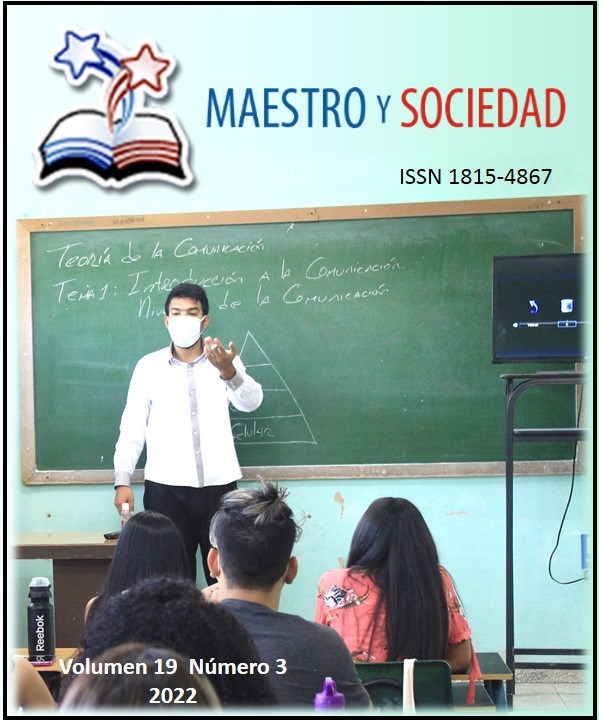Creative room as a teaching-learning strategy in the professional training process
Keywords:
Competency-based education, learning through experience, learning through practice, creativity, professional trainingAbstract
This research analyzes the contribution of the creative room as a teaching-learning strategy in the professional training process of the students of the Universidad Laica Eloy Alfaro de Manabí, Sucre Bahía de Caráquez extension. The methodology was descriptive, qualitative and quantitative since an in-depth interview was carried out with the coordinator of the aforementioned room, in addition, a Likert scale survey was applied to a population of 299 people, of which a sample of 25 teachers and students was considered. 54 students. The most relevant results mention that 88% of the teachers surveyed expressed that the study environment is always important to make students more creative; while 74% of the learners responded that they almost always use what they learned in everyday life. It is stated that both classroom environments and meaningful learning fundamentally contribute to the use of the knowledge acquired in a creative way according to the needs presented in the professional training of future graduates.
References
Beltrán LLera, J. A. (2003). Estrategias de Aprendizaje. Revista de Educación, 2(332), 55–73. http://www.educacionyfp.gob.es/dam/jcr:0bc115bf-2ee5-4894-91f5-7e32e07059d4/re3320411443-pdf.pdf
Camarero Suárez, F. J., Martín del Buey, F. de A., & Herrero Díez, F. J. (2000). Estilos y estrategias de aprendizaje en estudiantes universitarios. Psicothema, 12(4), 615–622. https://digibuo.uniovi.es/dspace/bitstream/handle/10651/27505/Psicothema.2000.12%284%29.615-22.pdf?sequence=1&isAllowed=y
Fernández Fernández, I., Eizagirre Sagardia, A., Arandia Loroño, M., Ruiz de Gauna Bahillo, P., & Ezeiza Ramos, A. (2012). Creatividad e innovación: claves para intervenir en contextos de aprendizaje. REICE. Revista Iberoamericana Sobre Calidad, Eficacia y Cambio En Educación, 10(2), 23–40. https://dialnet.unirioja.es/servlet/articulo?codigo=4115093
González-Vázquez, B. (2019). ¿Cómo mejorar el aprendizaje? Influencia de la autoestima en el aprendizaje del estudiante universitario. Revista Complutense de Educacion, 30(3), 781–795. https://doi.org/10.5209/RCED.58899
González, V., & González, R. (2008). Competencias genéricas y formación profesional: un análisis desde la docencia universitaria. Revista Iberoamericana de Educación, 47(47), 185–209. http://www.rieoei.org/rie47a09.pdf
López Belmonte, J., Moreno Guerrero, A. J., Pozo Sánchez, S., & López Núñez, J. A. (2020). La Formación Profesional ante el reto de las TIC: Proyección de la realidad aumentada entre su profesorado y predictores de uso. Revista Complutense de Educación, 31(4), 423–433. https://doi.org/10.5209/rced.65443
Merchan-Cruz, E. A., Lugo-González, E., & Hernández-Gómez, L. H. (1980). Aprendizaje significativo apoyado en la creatividad e innovación. South African Medical Journal = Suid-Afrikaanse Tydskrif Vir Geneeskunde, 57(14), 523–529. http://www.ncbi.nlm.nih.gov/pubmed/6988988
Mitjáns Martínez, A. (2013). Aprendizaje creativo: desafíos para la práctica pedagógica. https://www.icesi.edu.co/revistas/index.php/revista_cs/article/view/1574/2045
Moreira, M. A. (2014). Aprendizaje significativo: un concepto subyacente. Ingenio y Conciencia Boletín Científico de La Escuela Superior Ciudad Sahagún, 1(1), 19–44. https://doi.org/10.29057/ess.v1i1.1343
Reyes, O., & Hernández, G. (2019). Identificación y práctica de valores en la formación universitaria. Rev. Cubana Edu. Superior, 38(2). http://scielo.sld.cu/scielo.php?script=sci_arttext&pid=S0257-43142019000200017
Published
How to Cite
Issue
Section
License
Copyright (c) 2022 César Arturo Carbache-Mora, Michell Estefanía Marín-Moreira

This work is licensed under a Creative Commons Attribution-NonCommercial-NoDerivatives 4.0 International License.
This journal provides immediate open access to its content, based on the principle that offering the public free access to research helps a greater global exchange of knowledge. Each author is responsible for the content of each of their articles.



























 Universidad de Oriente
Universidad de Oriente 